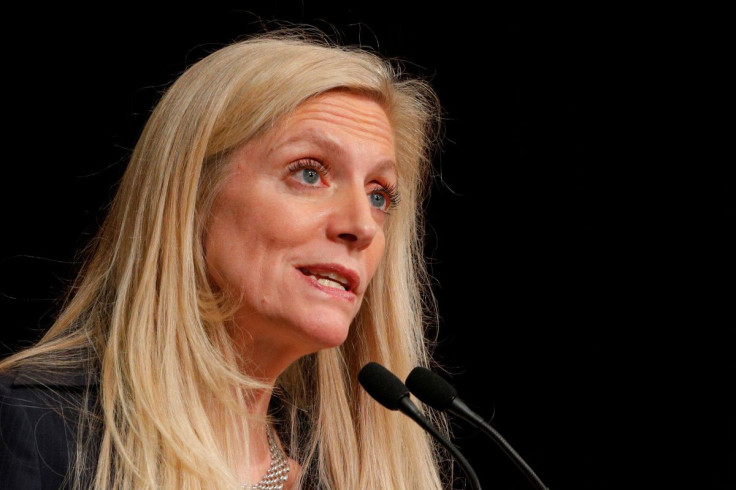Fed's Brainard Sees Rapid Balance Sheet Runoff, Rise To Neutral

Federal Reserve Governor Lael Brainard on Tuesday said she expects methodical interest rate increases and rapid reductions to the Fed's balance sheet to bring U.S. monetary policy to a "more neutral position" later this year, with further tightening to follow as needed.
"I think we can all absolutely agree inflation is too high and bringing inflation down is of paramount importance," Brainard said at a conference at the Minneapolis Fed.
To do so, she said, the Fed will raise rates "methodically" and as soon as next month begin to quickly ramp up reductions to its nearly $9 trillion balance sheet to a "considerably" more rapid pace of runoff than the last time the Fed shrank its holdings.
The rapid portfolio reductions "will contribute to monetary policy tightening over and above the expected increases in the policy rate reflected in market pricing and the Committee's Summary of Economic Projections," she said.
Brainard's remarks, her first since the Fed last month raised rates for the first time in three years, sent stocks down and Treasury yields up to multi-year highs as investors digested the hawkish tone from one of the Fed's usually more dovish policymakers.
Investors are concerned by "the speed and aggressiveness of the Fed with its balance sheet reductions," said CFRA Research's Sam Stovall.
Fed projections released after the March meeting showed most policymakers thought the policy rate would end the year at least in the range of 1.75%-2%, if not higher, a pace that would require quarter-point rate increases at all six remaining Fed meeting this year.
Markets see the Fed moving faster, delivering half-point rate hikes in May, June and July, to bring the rate to 2.5%-2.75% by the end of this year. That would be above the 2.4% level that most Fed policymakers view as "neutral."
The Fed on Wednesday releases minutes of its March meeting that are expected to provide fresh details on the pace and scope of the Fed's plans to reduce its bond holdings. Brainard provided a bit of a preview.
"Given that the recovery has been considerably stronger and faster than in the previous cycle, I expect the balance sheet to shrink considerably more rapidly than in the previous recovery, with significantly larger caps and a much shorter period to phase in the maximum caps compared with 2017-19," Brainard said.
Back then, the Fed began by limiting runoff from its $4.5 trillion balance sheet to $10 billion a month, and took a year to ramp that up to a maximum of $50 billion a month. Analysts expect a pace about twice that this time around.
MORE IF NEEDED
The Fed targets 2% inflation, as measured by the personal consumption expenditures price index. In February the PCE price index was up 6.4% from a year earlier.
Brainard said she sees upside risks to inflation from Russia's invasion of Ukraine, and noted that COVID lockdowns in China could worse supply chain bottlenecks that have kept upward pressure on prices.
And though the geopolitical events could pose risks to growth, she noted, the U.S economy has considerable momentum and the labor market is strong.
Unemployment last month fell to 3.6%, just a hair above its pre-pandemic level.
The Fed's signaling on policy has already tightened financial conditions, Brainard said, with mortgage rates up a full percentage point in the past few months.
"We are prepared to take stronger action" if warranted by readings on inflation or inflation expectations, Brainard said, adding that she would also be watching the yield curve for any signs of downside risks to the economy.
It was unclear from Brainard's remarks whether she feels a rapid portfolio runoff would render bigger-than-usual rate hikes unnecessary.
Kansas City Fed President Esther George, who also supports a faster balance sheet runoff, left that door open.
"I think 50 basis points is going to be an option that we'll have to consider, along with other things," George told Bloomberg TV on Tuesday.
© Copyright Thomson Reuters 2024. All rights reserved.




















